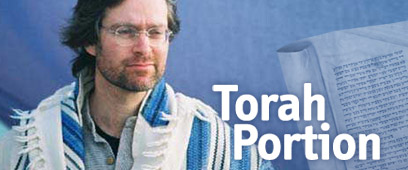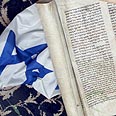

'The festivals are not an irrelevant fringe movement in Israeli society'
Photo: Reuters
Every year in Israel more than 50,000 Israelis participate in what is called the festival movement. In these festivals mainstream Israelis of all ages participate in an atmosphere of love, belonging and spiritual search.
Despite my disagreement with many of the practices of the festivals, I, together with my spiritual community Bayit Chadash, have taken a leadership role in what might be called the Jewish dimension of the festival movement.
The festivals are not an irrelevant fringe movement in Israeli society; they are probably the largest public gatherings in the country today. Hundreds of thousands of Israelis have traveled to India and other eastward destinations after the army in search of spiritual fulfillment.
A close friend who is a well known religious Zionist rabbi said to me recently, "These kids are going to India as a form of rebellion against the religious establishment." I explained to him that they were not rebelling against the religious establishment. Rebellion is a form of relationship.
For most of these kids and for most of the festival goers the religious establishment is not even on the radar screen. My rabbi colleague was surprised and hurt by this analysis of mine, but recognizing the truth in it, he asked me why this was so.
The secret I said to him lies in this weeks Parshat Hashavua; it is the secret of El Shaddai which was the very core of the spiritual experience upon which Judaism was formed and which has been largely lost in contemporary religious Judaism.
This weeks Parsha begins with a description – rare in the Torah – of the nature of the spiritual experience of the founders of the Jewish people, Avraham, Yitzchak and Yaacov; "I appeared to Avraham, Yitzchak and Yaacov as El Shaddai".
A careful reading of this text in comparison with a parallel text in Bereshit 49:25 and many other biblical verses, yields the simple truth which many of the classic Orthodox commentators of the text understood; The word Shaddai in this context means breast. El Shadai - according to Isaac Luria and many other great kabbalists and Orthodox teachers - means the manifestation of God most closely symbolized by the female breast. (See for example Zohar vol. 2 253b and Luria, Shaarei Ma'amarei Rashbi Perush HaIdra Zuta Kaddisha)
'Sucking from the breast of El Shaddai'
What this is expressing is the feeling of being completely and radically embraced in God's presence and love. It is this experience which is described in the Song of Songs as "Smolo Tachat Roshi VeYemino Techabkeni"; "God's left hand is under my head and his right hand embraces me". This is not the experience of talking to God but of being immersed in a direct and unmediated way in the fullness of the divine breast which nurtures and nourishes our very existence. This was the spiritual reality experienced by my teacher Chassidic Master Mordechai Lainer of Izbica when he said that faith means the certain knowledge of direct experiences, that wherever one falls he falls into God's hands.
Indeed the very word Emunah derives from the Hebrew word Omen; as used by Moses in the book of numbers "Ka'asher Yisa HaOmen et HaYonek"- "as the nursing mother carried the suckling". This sense of Emunah does not describe an intellectual relationship to the divine, or even only a relationship of command; it rather captures the sense of being completely absorbed held and loved in God's infinite embrace.
The religious establishment in both the religious Zionist and the Haredi worlds is filled with many beautiful and holy people. At the same time it has lost touch with this sense of El Shaddai. Judaism is either presented as a core obligation or as a wise system of psychological and moral Mitzvot or as both. And while all of these reflect some truth they both miss the core animating experience which gave birth and needs to continue to nourish religious engagement and spiritual experience.
That is the embrace of El Shaddai R. Yitzchok Sagi Nahor, the great medieval kabbalist who wrote that knowing God is "Derech Yenika" and not "Derech Yediah". Indeed King David writes in Psalms "Taste and See that God is good" How many people today feel like they taste God?
Sadly the reason this is so, is that most rabbis today are not really spiritual teachers because they themselves have never truly experienced the sweetness and joy of merging with the Shekhina; of sucking from the breast of El Shaddai.
While there is much to critique in the festival movement and in the spiritual journeys of the seekers in the east, one thing is clear - in both places there is a profound experience of El Shaddai. The essence of the El Shaddai experience is to directly experience God; It is this sense that R. Levi Yitzchak of Berdichev referred to when he translated Yisrael as Yashar El; the direct and unmediated experience of the divine presence.
'Many of them will not remain in Israel'
This can be done through many forms of spiritual practice including Shirah Mekudeshet, deep and authentic prayer, kabbalistic mediation, or other forms of activity in which the Ani of the person merges with the great Ayin of God only to be reborn as an Ani who holds the radical certainty that at every moment he is being held in the arms of the living God. Smolo Tachat LeRoshi VeYemino Techabekeni.
Sadly this experience of devekut, the experience of El Shaddai, is almost entirely lacking in the religious world in Israel today. And when it is present, it is virtually inaccessible to the secular seeker.
I appeared on a recent Channel One religious television show in which I was asked why I went to teach at the festivals. Particularly – after I described the beauty of the Segol festival - the Rabbi who was invited to challenge me referred to this festival as "Mevot HaMetunafim". Clearly, he was referring to the fact that the festivals do not follow Halacha in the way they are run on Shabbat.
My point to him was very simple. Of course if I were running a festival, as an Orthodox Rabbi I would follow halacha, however there is no reason to expect the people running Segol to do so.
Sadly however he missed the entire point. What draws people to the festivals is the experience of El Shaddai. This was the experience of Abraham, Isaac and Jacob. They lived in a world where -according to a simple reading of the Torah and according to Maimonides – there was not yet any halacha. Halacha needs to add to the experience of El Shaddai and not destroy it.
Until we learn that essential truth, hundreds of thousands of Israeli will have their most important spiritual experiences in India. They will therefore see little reason in the long term to remain connected to the great vision of a Jewish people settled in the land of Israel. Many of them will not remain in Israel. Reclaiming the experience of El Shaddai is essential both for the future of Judaism as well as for the future of Zionism.
Rabbi Mordechai Gafni - Teacher and student of Torah; Leader of Bayit Chadash Spiritual Community and Movement; Chair of Integral Kabbalah at Integral Institute of Ken Wilber
The "Bayit Chadash" website: www.bayitchadash.org















